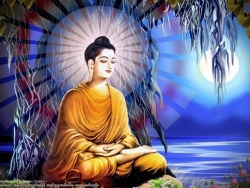Paranirmita
Heaven of Freely Enjoying Things Conjured by Others
[他化自在天] (Skt Paranirmita-vasha-vartin; Jpn Takejizai-ten)
Also, sixth heaven. In ancient Indian cosmology, the sixth and highest of the six heavens in the world of desire. Its dwellers make free use of things conjured by others for their own pleasure, hence the name of this heaven. Their life span is sixteen thousand years, one day of which is equal to sixteen hundred human years. Their life span is therefore equal to about 9.3 billion human years. The Heaven of Freely Enjoying Things Conjured by Others is the abode of the devil king, called Mara in Sanskrit, and therefore it is known as the Heaven of Mara or the Heaven of the Devil. The devil king abiding in this sixth heaven at the top of the world of desire is often referred to as the devil king of the sixth heaven. He is said to harass practitioners of Buddhism himself or through his subordinates to dissuade them from practice and prevent their attaining Buddhahood.
See also; devil king of the sixth heaven.
Mara can be personified in the form of a divine being. In Buddhist cosmology, he resides in the highest of the divine realms of the plane of sensory desires (Desire Realm), on top of Mount Meru. This is called the Heaven of Those Who Have the Power of Emanations over Others (gZhan-‘ phrul dbang-byed, Skt. Paranirmita-vashavartin). Buddhists usually explain this heaven as where gods have the power to enjoy the emanations of others, but the Tibetan and Sanskrit terms make more sense when they are understood in accord with the Hindu myth.
Māra appears in the Atharvaveda as a personification of death associated with the god Yama, it is in Buddhism that he comes to the fore. There he takes on the role of a mythological antagonist or metaphorical opponent of the Buddha, his teachings, and his community. Māra, one of whose epithets is "the Evil One" (Skt., Pāpīyāṃs; Pali, Pāpimant), has sometimes been compared to Satan; in fact, he is a god, the chief deity of the Realm of Desire (Kāmadhātu), a position he earned by virtue of a meritorious deed in a past life. As such, he rules over most sentient beings who are caught up in saṃsāra (including humans and the lower deities). He resides in the Sixth Heaven of Buddhist cosmology, the dwelling place of the Paranirmita-vaśavartin gods, and so is sometimes called Vaśavartin (Pali, Vasavattī; "controlling"), or, in East Asia, King of the Sixth Heaven. As Lord of the Kāmadhātu, Māra is best understood as a divine king who wants to keep sentient beings under his command, that is, in his realm of life and death, of desire and ignorance. Hence he actively opposes anyone who seeks to escape from his dominion by attaining enlightenment.
